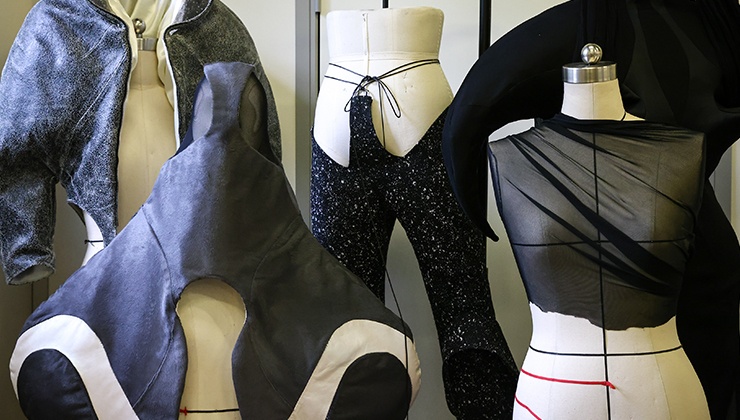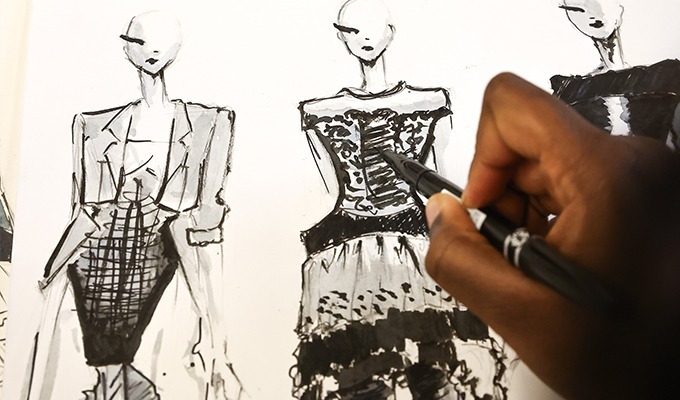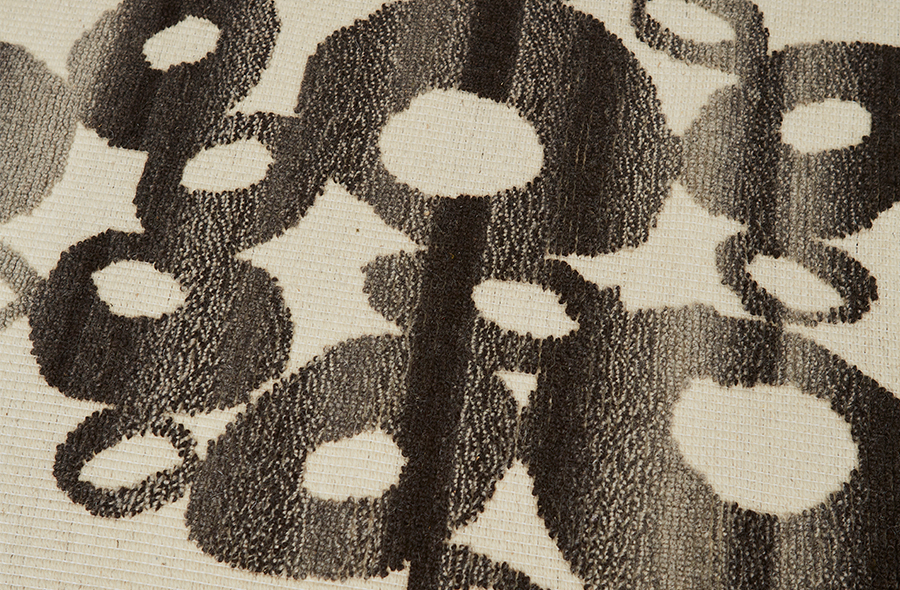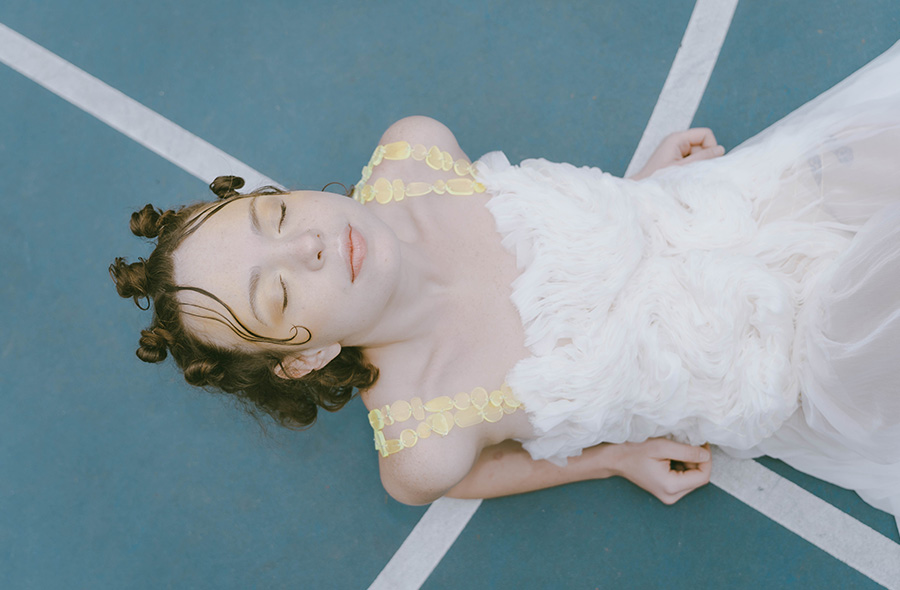- Available in: Paris
- Language: Full French or Full English
- Duration: 2 years
- Cooperative Education: French Language Only
- ECTS: 120
- Next intake: September 2026
A natural next step after a three-year bachelor's degree in fashion design, the Postgraduate Degrees in the field Fashion Designing and Creativity are a two-year course of study that completes your professional education.
Year 1 is a core curriculum year, at the end of which students choose their specialization for Year 2.
This Postgraduate program offers four specialization tracks
- Postgraduate Degree Fashion House Creative Direction
- Postgraduate Degree Sustainable Fashion – Design Major
- Postgraduate Degree Fashion Entrepreneurship – Design Major
- MBA Fashion Image & Media Production
This creative direction specialization is designed for students who wish to pursue a career in fashion house management. The program is structured around 6 modules.
The first module is a workshop designed to help students develop their artistic identity, allowing them to discover themselves not only as creatives but also as individuals.
The other 5, titled « Studios », are developed around the foundational themes of the fashion industry. They invite students to analyze and audit the strategic directions set by famous Artistic Directors, before deconstructing them and proposing their own visions. Each Studio benefits from a multidisciplinary environment combining business, creative, and technical skills.
The program’s innovative teaching approach is based on the concept of teacher-student interaction. The program is structured around a studio environment. The student is responsible for defining and adhering to a progress plan, marked by deliverables. At each stage of one’s work, the teaching teams help the student progress, overcome difficulties, explore new techniques, and strengthen one’s own creative positioning.
Postgraduate - Year 1
The first year of the Postgraduate programs at IFA Paris provides a shared academic and practical foundation for all students, regardless of their future specialization. Rooted in the belief that creativity and commerce are inseparable in the contemporary fashion industry, this year is designed to equip students with the core competencies required to operate effectively across design, production, business development, and brand strategy.
This common curriculum serves as a launchpad for second-year specialization by building a comprehensive understanding of the fashion system through a multidisciplinary approach. Students are immersed in both creative and strategic processes—fostering their ability to move fluidly between artistic direction and business planning. Through collaborative projects, real-life industry engagements, and targeted workshops, they gain the ability to contextualize their practice within broader social, cultural, and technological frameworks.
The 1st year courses are common to all specializations. Their aim is to establish common fundamentals to reconcile commercial and creative challenges.
French program : Cooperative education
Or English program : 6-months internship
First-year highlights
- Partnerships with companies to organize battles and masterclasses
- Personalised support
- 6-month internship
Learning Objectives
By the end of the first year, students will be able to:
-
Integrate Creative and Strategic Thinking
- Combine artistic expression with commercial insight to develop compelling fashion concepts.
- Understand the interconnectedness of design, branding, marketing, and production within the fashion value chain.
-
Master Fashion Development Processes
- Navigate each stage of the creative process, from concept generation to visual storytelling.
- Apply contemporary and historical references to inform design aesthetics and styling choices.
-
Develop Entrepreneurial and Operational Skills
- Identify market opportunities and design strategic business plans to launch or grow fashion ventures.
- Understand supply chain dynamics, distribution models, and the fundamentals of production.
-
Engage with Sustainable and Technological Innovations
- Explore sustainable practices and cutting-edge technologies in design and production.
- Evaluate the environmental and ethical impact of materials, sourcing, and business models.
-
Communicate Effectively Across Contexts
- Collaborate in interdisciplinary and intercultural teams.
- Present ideas clearly and confidently, both visually and verbally, in professional contexts.
-
Shape a Professional Identity
- Define a clear trajectory for second-year specialization through reflective practice and mentorship.
- Build a coherent personal brand and professional portfolio aligned with industry expectations.
Course Modules
Creative Processes
This module grouping is designed to enhance students’ creative capabilities. It focuses on nurturing innovative thinking and artistic expression through various stages of the fashion design process. By studying contemporary and historical influences, participating in workshops, and collaborating on design projects, students will develop a unique creative approach and gain the skills to bring their fashion concepts to life.
- Contemporary Creativity Analysis
- « Creative process » workshop
- « Digital Design » Workshop
- Iconography and Style in Fashion
- Creative Direction Enhanced by AI
Business Development Processes
This module focuses on the innovative processes involved in developing and launching successful fashion ventures. Students will learn how to identify market opportunities, create compelling business plans, and implement effective strategies for growth. Emphasis is placed on fostering creative thinking and problem-solving abilities to drive innovation in product development, branding, and marketing.
- Business Planning
- Smart Supply Chain System
- Intellectual property
- Branding
- Distribution
Production
The Production Processes in Fashion module grouping focuses on providing a comprehensive understanding of the manufacturing processes in the fashion industry. This module covers the entire production cycle, from concept development and material selection to garment construction and quality control. Students will explore innovative production techniques, sustainable practices, and the latest technological advancements in fashion manufacturing in order to develop their own collection.
- Pattern & Draping Development
- Innovative materials
- Collection Development
2 Electives to Choose From
Students will get to pick 2 electives out of 6 available. Each of them gives a taste of what the 5th year specializations will encompass. Such a structure provides an opportunity for full customization of the learning experience.
- Luxury
- Magazine project / Media Management
- Fashion and eco-responsibility
- Entrepreneurship
- Tech
- Fashion Marketing & Management
Fashion Lab
The Fashion Lab module grouping is handled by the Direction of Corporate Relations of IFA Paris. Through a variety of practical workshops, students will get the opportunity to be involved in real-life case studies provided by partner brands. They will also have the opportunity to work on their professional profile through customized coaching sessions to ensure they can secure a 6-month internship.
Postgraduate - Year 2
The program's innovative teaching approach is based on the concept of teacher-student interaction. The program is organised to mimic the environment of a fashion studio. The student is responsible for defining and respecting a progress plan comprising deliverables. At each stage of their work, the teaching teams help them to move forward, overcome difficulties, explore new techniques and strengthen their own creative positioning.
French program : Cooperative education
Or English program : 6-months internship
Second-year highlights
- A design bootcamp in the first few weeks to kick off the conceptualization of one’s design strategy
- A very pragmatic program based on inverted teaching methods and fashion studio environment work
- Production of a lookbook and portfolio that showcases the collection proposal, backed by a comprehensive business plan
Learning Objectives
-
Nurture a Visionary Creative Identity:
- Students will develop the skills to craft and implement personal creative visions that anticipate and shape future fashion trends, redefining brand identity through innovative aesthetics, cultural foresight, and a deep understanding of the evolving global fashion landscape.
-
Lead Future-Forward Multidisciplinary Collaboration:
- Students will excel in leading diverse creative teams with a focus on fostering innovation, leveraging cross-disciplinary collaboration, and integrating cutting-edge technology to produce transformative fashion collections and campaigns that set new industry standards.
-
Leverage Next-Generation Technologies for Creative Innovation:
- Students will explore and master the use of emerging technologies such as AI-driven design, virtual and augmented reality, and digital fashion platforms to create immersive, futuristic brand experiences that challenge traditional fashion narratives and engage with new consumer paradigms.
-
Strategically Evolve Global Fashion Brands:
- Students will learn to strategically position fashion houses at the forefront of the industry by developing and implementing creative directions that are both globally resonant and future-proof, combining deep cultural insights, sustainability, and innovative storytelling to redefine brand relevance in an increasingly interconnected world.
Course Modules
Creative Journey
This module is a cornerstone of the program, crafted to help students discover and refine their unique creative voice as future creative directors. It encourages self-exploration and innovation. Through hands-on projects, collaborative workshops, and mentorship from industry leaders, students will learn to articulate their vision, develop compelling design narratives, and lead creative teams effectively.
Studio 1 – Brand Revitalization
The first studio is a dynamic workshop designed to teach students how to critically assess and provide innovative strategies for revitalizing and rejuvenating a fashion brand. Through hands-on projects, students will learn to analyze brand identity, market positioning, and consumer engagement. The workshop emphasizes creative direction, exploring techniques for refreshing brand aesthetics, storytelling, and marketing campaigns. Guided by industry experts, students will develop actionable plans to breathe new life into established brands, ensuring their relevance and appeal in a competitive fashion landscape.
Studio 2 – Heritage Evolution
The second studio is an immersive workshop designed to teach students how to direct the preservation of fashion heritage while positioning a brand as a contemporary player. Students will explore the rich history and cultural significance of a fashion house, learning how to leverage this heritage in modern branding and marketing strategies. Through hands-on projects and critical analysis, participants will develop innovative approaches to integrating historical elements with contemporary trends, ensuring brands remain relevant, competitive and creatively edgy in today’s market. This module equips students with the expertise to balance tradition and innovation in the fashion industry.
Studio 3 – Image Crisis
The third studio is an intensive module designed to help students effectively manage and resolve image issues for fashion brands resulting from PR scandals. Through a combination of theoretical frameworks and practical exercises, students will learn strategies for crisis communication, brand rehabilitation, and reputation management. The module covers topics such as media relations, social media management, stakeholder engagement, and ethical considerations in crisis scenarios.
Studio 4 – Environmental Consciousness
The fourth studio focuses on transforming a fashion house collection development to align with sustainable standards. Students will learn to integrate eco-friendly materials, ethical production processes, and sustainable design principles into their creative practices. The module covers critical topics such as life cycle analysis, waste reduction, and the impact of fashion on the environment. Through practical projects and industry collaborations, students will develop strategies for implementing sustainability initiatives within fashion collections, fostering an innovative approach to environmental responsibility in the fashion industry.
Studio 5 – The Future of Fashion
The fifth and last studio investigates the integration of technology solutions within the creative direction strategies of a fashion house. This module delves into the intersection of fashion and technology, exploring innovations such as AI, virtual reality, and digital design tools. Students will learn how these technologies can enhance creativity, streamline production processes, and transform consumer experiences. They will develop the skills to strategically implement tech-driven solutions that align with and elevate the creative vision of fashion brands.
Capstone
In the Capstone Project, students are expected to create a link between the course knowledge and their practical understanding of the industry’s up-to-date best practices to prepare a fully-fledged plan for the creative direction of a fashion house.
Program Compliance Data
Course duration
The Fashion Marketing and Product Development Manager course consists of a two-year cooperative education, with +/- 455 hours per year.
Operational objectives/Target skills
- Conduct the strategic analysis and development plan of a fashion brand
- Manage the communication and marketing activities of a fashion brand
- Assess the performance of a fashion brand’s marketing strategy
- Manage the development process of a fashion collection or product
Teaching methods employed
Classes are held in person or online and take the form of group work, face-to-face teaching, conferences, and more.
Assessment methods
Oral and written assessments, continuous assessment, evaluation during project phases.
Certification requirements at the end of year 2
The “Manager of Fashion Product Development and Marketing” Level 7 certification (equivalent to a Master’s degree) is awarded upon successful completion of all competency blocks.
RNCP Title: “Manager of Fashion Product Development and Marketing” – Level 7 (equivalent to a Master’s degree), awarded by IFA Paris – registered in the RNCP (French National Directory of Professional Certifications) by decision of France Compétences on March 28, 2025, for a period of 5 years (RNCP No. 40351).
In case of partial validation, any competency block obtained is valid for life.
No pathway/No transfer
Result indicators at the end of year 2
- Drop-out rate: N/A (1st class graduates in 2026)
- Attendance rate for certification tests: N/A (first graduating class in 2026)
- Success rate of the program: N/A (first graduating class in 2026)
- Further study rate: N/A (1st class graduates in 2026)
- Overall employment rate at 6 months: 86%
- Employment rate in the targeted profession(s) after 6 months: 71%
- Value added by the establishment: N/A (1st class graduates in 2026)
- Drop-out rate: N/A (1st class graduates in 2026)
+ More indicators available on the website: https://www.inserjeunes.education.gouv.fr/diffusion/accueil
Admission Requirements for Postgraduate
Prerequisites Year 1:
- Applicants must have successfully completed 3 years of higher education (equivalent to 180 ECTS credits)
- Depending on the chosen teaching language (English or French), non-native speakers should provide a language proficiency score:
- English teaching language: an IELTS score of 6.5 or above, or a TOEFL score of 79 or above. Alternatively, provide an English training certificate or proof of previous education in English.
- French teaching language: a TCF score of B2 or equivalent. Alternatively, a proof of previous education in French.
- Significant professional experience in related fields preferred, but not required (internships are considered).
Prerequisites Year 2:
- Applicants must have successfully completed 4 years of higher education (equivalent to 240 ECTS credits)
- Depending on the chosen teaching language (English or French), non-native speakers should provide a language proficiency score:
- English teaching language: an IELTS score of 6.5 or above, or a TOEFL score of 79 or above. Alternatively, provide an English training certificate or proof of previous education in English.
- French teaching language: a TCF score of B2 or equivalent. Alternatively, a proof of previous education in French.
- Significant professional experience in related fields preferred, but not required (internships are considered).
Required documentation:
- Resume
- Motivation letter
- Passport photo
- Passport copy for non-EU applicants and ID copy for EU applicants
- Language proficiency certificate
- Proof of validation of the above-mentioned prerequisite
- Portfolio
For more information about the application process, please visit our How to apply page.

Accessibility
You may be interested in the possibility of enrolling on one of our programs.
Contact us so that we can provide you with all the information and advice you need: accessibilite@ifaparis.com.



